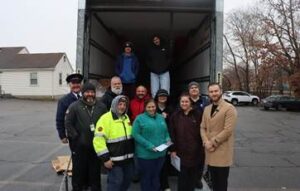WASHINGTON — The Federal Motor Carrier Administration (FMCSA) is proposing to narrow the scope of regulations from which automatic relief is provided for motor carriers providing direct assistance when an emergency has been declared.
In a notice of proposed rulemaking (NPRM) on the Federal Register, the changes “would ensure that the relief granted through emergency declarations is appropriate and tailored to the specifics of the circumstances and emergency being addressed. The (FMCSA) also proposes revisions to the process for extending an automatic emergency exemption where circumstances warrant.”
The NPRM would “modify the definition for emergency to clarify that emergency regulatory relief under rule 390.23 generally does not apply to economic conditions that are caused by market forces, including shortages of raw materials or supplies, labor strikes, driver shortages, inflation, or fluctuations in freight shipment or brokerage rates, unless such conditions or events cause an immediate threat to human life and result in a declaration of an emergency.”
Further, the NPRM “would also remove the definition for emergency relief as that term would no longer be used in rule 390.23 and would amend the definition of direct assistance to incorporate the essential components of the former emergency relief definition. It would also move the definition for residential heating fuel from the text of 390.23 and place it in the definition sections, 390.5T and 390.5.”
While presidential declarations of emergency would continue to trigger a 30-day exemption from all Federal Motor Carrier Safety Regulations in parts 390 through 399, the proposed rule would limit the duration and scope of the existing automatic regulatory relief that takes effect upon a regional declaration of an emergency by a governor, a governor’s authorized representative or FMCSA, according to the NPRM.
The automatic regulatory relief would apply for only five days, as opposed to 30 days, and would exempt CMV drivers only from the HOS regulations in rules 395.3 and 395.5, as opposed to all regulations in parts 390 through 399.
“This change would both shorten the time the automatic regulatory relief is in place as well as limit the scope of relief provided, ensuring that any impact on safety continues to be minimized during the period of the automatic regulatory relief,” according to the NPRM. “FMCSA determined that the period of five days for automatic relief was appropriate for regional declarations of emergency, as its experience in monitoring emergency declarations demonstrated that in most cases, the actual emergency (e.g., the specific weather event or highway accident) is over within five days.”
In a statement on its website Land Line, the Owner-Operator Independent Drivers Association (OOIDA) said that “FMCSA’s acknowledgment that emergency declarations haven’t negatively affected safety shows that the agency should do more to grant general hours-of-service flexibility to truck drivers.”
“We don’t anticipate there will be any noticeable changes for drivers operating in emergency areas under these modifications and expect the agency would swiftly extend any exemption in scenarios requiring assistance after the initial five-day period,” said Jay Grimes, OOIDA’s director of federal affairs. “We also agree with FMCSA’s assessment that there is ‘no information that suggests that past or existing emergency exemptions have in fact negatively impacted road safety.’ Every emergency declaration, including the extended COVID-19 hours-of-service waiver that was in place for more than two-and-a-half years, has shown that drivers are not going to abuse HOS flexibility at the risk of highway safety. We urge FMCSA to take further action to promote practical HOS flexibility in all settings, not just emergency conditions.”
The Trucker News Staff produces engaging content for not only TheTrucker.com, but also The Trucker Newspaper, which has been serving the trucking industry for more than 30 years. With a focus on drivers, the Trucker News Staff aims to provide relevant, objective content pertaining to the trucking segment of the transportation industry. The Trucker News Staff is based in Little Rock, Arkansas.















